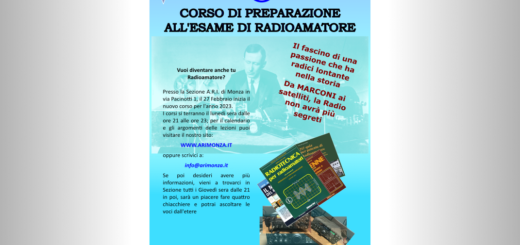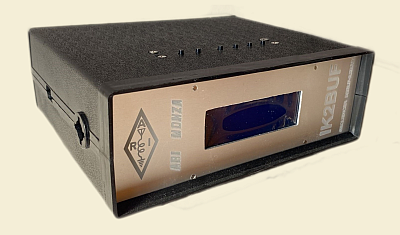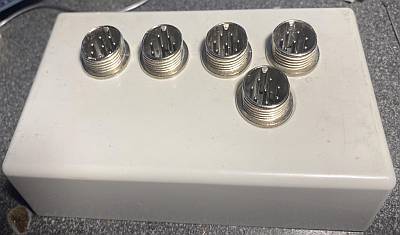contatto 22 novembre
An International Space Station school contact has been planned with participants at I.C. Villasanta, Villasanta Italy and College Pierre de Fermat, Toulouse, France on Wednesday 22 November 2017.
The radio contact is scheduled to begin at approximately 08:43 UTC.
The contact will be a telebridge between NA1SS and K6DUE.
The event will be webcast from the schools on:
https://www.youtube.com/watch?v=QBv9ePxki1Q
https://www.youtube.com/watch?v=9IkbxqzjfWw
School presentation:
I.C. Villasanta, Villasanta, Italy
“Enrico Fermi” Middle School is located in the center of Villasanta a small town near Monza in the North of Italy, there are 450 students and 40 teachers. Since year 2014, our school and “Pierre de Fermat” Middle School have been involved in a twinning project based on online communication and exchange visits. Our Italian Middle School will be in charge of establishing the TELEBRIDGE contact; ARISS technical mentors in Villasanta will help us on logistics and equipment.
The French and the Italian students will ask questions in Italian from their respectful schools. ARI “Erba” is the amateur radio school club cooperating with us (12-14).
College Pierre de Fermat, Toulouse, France
“Pierre de Fermat” Middle School is located in the centre of Toulouse in the South of France. There are 900 students and 40 teachers. Since year 2014 our French Middle School and the Italian “E. Fermi” have been involved in a twinning project based on online communication and exchange visits.
The Italian Middle School will be in charge of establishing the TELEBRIDGE contact, ARISS technical mentors in Villasanta will help them on logistics and equipment. The French and the Italian students will ask questions in Italian from their respectful schools. ARI section Erba is the amateur radio school club cooperating with us (12-14).
Participants will ask as many of the following questions as time allows:
1. In che cosa consiste la formazione di un astronauta? Che studi hai fatto?
2. C’e’ stato un insegnante che ha avuto un ruolo importante nella tua vita?
3. Come si modificano il sonno e i sogni sulla ISS?
4. Quali sono gli effetti della vita nello Spazio sull’organismo?
5. Che sensazione si prova in orbita? Mi chiedo se hai mai pensato di paragonarti ad un diversamente abile in quelle condizioni?
6. Come riuscite a misurare lo scorrere del tempo se continuate a muovervi attorno alla Terra?
7. In che modo l’Italia e la Francia contribuiscono alle missioni sulla ISS?
8. Puoi raccontarci qualche curiosita’ su una delle tue missioni sulla ISS?
9. Poiche’ nello spazio tutto “galleggia”, ricorrete ad un particolare tipo di cibo: ma e’ buono? Che cosa mangerai oggi?
10. Che cosa sogna di scoprire un astronauta scienziato nello Spazio?
11. Le tue missioni nello Spazio hanno cambiato qualcosa della tua personalita’ e del modo in cui vedi le cose?
12. Hai mai visto qualcosa di strano nello Spazio che ti ha fatto pensare ad altre forme di vita?
13. Com’e’ una giornata tipo sulla ISS?
14. Dalla ISS hai la fortuna di osservare il nostro Pianeta Terra. Nel corso delle tue tre missioni hai potuto riscontrare dei cambiamenti evidenti?
15. Questa tua terza missione si chiama “VITA”. Perché’ e in cosa consiste?
16. In che cosa consiste l’esperimento “Perseo”?
17. Cosa si prova a lasciare la Terra e la propria famiglia per andare nello Spazio? E a tornare dopo tanto tempo?
18. Al rientro e’ dura ricominciare la vita quotidiana? La riabilitazione è difficile? In che cosa consiste e quanto dura?
19. Che cosa o chi ti ha spinto a diventare astronauta? Era un tuo sogno da bambino?
20. Hai mai provato paura prima o durante una missione? Se si, come riesci a superarle?
Translation:
1. What does training to be an astronaut consist in? What did you study at college and at university?
2. Was there a teacher that played an important part in your life?
3. How do sleep and dreams change on the ISS?
4. What are the effects of life in Space on the organism?
5. How does it feel to move around in the absence of gravity? Have you ever
felt like comparing yourself to a disabled person, in those conditions?
6. How do you measure the passage of time as you are continuously traveling around the Earth?
7. In which way do Italy and France contribute to the missions on the ISS?
8. Can you tell us a curious episode about one of your missions on the ISS?
9. As in Space everything “floats”, you have particular type of food, but is it good? What are you eating today?
10. What does a scientific astronaut dream of discovering in Space?
11. Have your missions in Space changed something in your personality or how you see things?
12. Have you ever seen something strange in Space that made you wonder that there might be other forms of life in the universe?
13. What is a typical day on the ISS like?
14. From the ISS you have the fortune of observing our Planet Earth. During your three missions did you notice any obvious changes?
15. This, your third mission is called “VITA”. Why? What does it consist of?
16. What does the experiment “Perseo” consist of?
17. How does it feel to leave Earth and one’s family to go into Space? And returning after a long period?
18. Once back on Earth, is it difficult going back to everyday life, do you have to do rehabilitation and how long does it take?
19. What or who made you want to become an astronaut? Was it your dream as a child?
20. Have you ever been afraid before or during a mission? If so how do you overcome your anxiety?
ARISS is an international educational outreach program partnering the volunteer support and leadership from AMSAT and IARU societies around the world with the ISS space agencies partners: NASA, Russian Space Agency, ESA, JAXA, and CSA.
ARISS offers an opportunity for students to experience the excitement of Amateur Radio by talking directly with crewmembers on board the International Space Station. Teachers, parents and communities see, first hand, how Amateur Radio and crewmembers on ISS can energize youngsters’ interest in science, technology, and learning.
73






